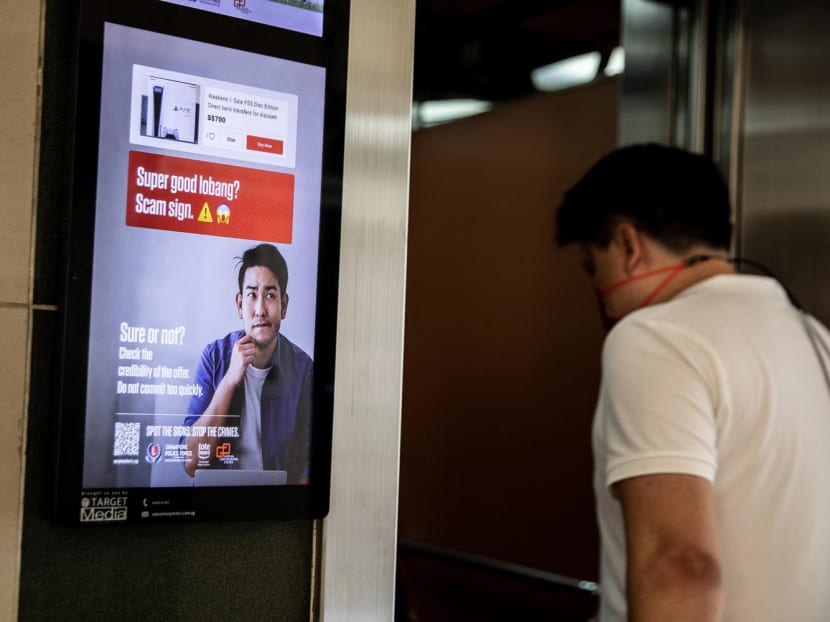Commentary: Why 'digital trust' matters, and how Singaporeans can help strengthen it
Were you a victim of online scams, or do you know anyone who was? In 2022, some S$660.7 million — 5 per cent more than the previous year — was lost to scams in Singapore, many of which were digital scams.
Were you a victim of online scams, or do you know anyone who was? In 2022, some S$660.7 million — 5 per cent more than the previous year — was lost to scams in Singapore, many of which were digital scams.
As more of our activities take place in the digital realm, scams are just one example of online threats that we face daily when we check out shopping carts on online marketplaces, pay vendors through e-wallets or fill up online forms.
Worryingly, more among us could be at risk if perpetrators gain access to advanced tools such as artificial intelligence (AI), enabling them to launch more sophisticated attacks at scale.
Left unchecked, this trend will erode digital trust, which is defined by Singapore’s tech industry association, SGTech, in its recent White Paper as the confidence participants have in the digital ecosystem to interact securely in a transparent, accountable, and frictionless manner.
GOVERNMENT AND INDUSTRY PARTNERSHIPS ARE CRUCIAL
In this dynamic digital space, all stakeholders — government, businesses, and individuals — have a part to play in preserving digital trust.
On the Government’s part, it adopts a multi-pronged approach.
First, we have legislation and regulations to tackle online threats such as fake news, data misuse, and privacy breaches.
These rules form the baseline safeguards for our citizens. For instance, organisations are obliged to protect their customers' personal data under the Personal Data Protection Act (PDPA).
Second, the Government works closely with the industry to strengthen our digital trust ecosystem.
For example, providers of essential services, like banks and telcos, have implemented steps to make it harder for scammers to obtain credentials or monies from potential victims.
Businesses can also tap into a range of government schemes to enhance their digital trust posture and give greater confidence to their customers.
Such schemes include the Infocomm Media Development Authority’s Data Protection Trustmark and the Cyber Security Agency of Singapore (CSA)’s SG Cyber Safe programme.
Third, we are proactively building up the talent pipeline in digital trust.
SGTech projected that the local digital trust sector will grow from S$1.7 billion to S$4.8 billion by 2027, creating 45,000 digital trust-related jobs across the economy.
Besides having the skilled personnel to protect our digital ecosystem, these roles provide exciting and fulfilling careers for Singaporeans.
Importantly, SGTech formed an industry working group to develop a skills framework for digital trust, to identify and define the roles and responsibilities of digital trust professionals and bridge the gap between current organisational competencies and professional skills with the future demands of a digital trust workforce.
The framework will be launched by the end of this year.
Another good example of industry leadership is the MAP Initiative in Cyber Security and Digital Trust, launched last month by the Singapore Business Federation and CSA.
The programme aims to help enterprises across sectors to strengthen their cyber security posture, defence and response to cyber threats and enhance digital trust.
The programme, which helps firms access curated cybersecurity workshops and resources, is structured around a three-pronged guide that includes a mindset shift (changing the way we think about things), analysis of potential (figuring out what we could do), and pathway assignment (deciding on a plan to get there).
WHAT CAN ORGANISATIONS DO?
Studies show that consumers would hesitate to continue supporting an organisation when they experience a data breach.
Responsible companies know that they must not only take steps to prevent data breaches but also actively demonstrate their trustworthiness to consumers. Many progressive firms see this is a competitive advantage.
There are many ways for firms to get started.
Conducting a trust audit is one such measure. The audit identifies vulnerabilities in the organisations and outlines steps that the management can take to address them.
To signal “trustworthiness”, organisations can apply for certifications and accreditation, which validate their trust capabilities.
Adopting mutually recognised trust marks also facilitate data sharing by the organisation with their customers, partners, and suppliers across borders.
Through the help of organisations like SGTech, the Government is leading the establishment of codes of practice to set clear digital trust standards.
WHAT CAN EACH OF US DO?
Despite efforts from the Government and organisations, we should note that many successful cyber attacks were due to human error.
Therefore, as individuals and consumers, we must also do our part to keep ourselves and our loved ones safe.
CSA’s four cyber tips is a good place to start:
- Use strong passwords and enable two-factor authentication
- Spot signs of phishing
- Use anti-virus software
- Update one’s software and application promptly
It is also important to keep up to date with the latest tactics scammers use.
These may include impersonating an official or a loved one, using scare tactics to entice users to click on suspicious links, and offering investment opportunities or online shopping deals that seem too good to be true.
The National Crime Prevention Council’s “I Can ACT Against Scams” campaign launched earlier this year is a valuable resource.
“ACT” stands for “Add (security features), Check (scam’s glaring signs) and Tell (authorities about it)” — the three main actions that we can proactively take to safeguard ourselves and our community against scams.
We need to act quickly and decisively to safeguard the digital trust needed for our digital ecosystem to thrive.
Just as we don’t take our physical safety for granted, we all have a part to play in keeping ourselves and our loved ones safe and secure online.
ABOUT THE AUTHORS:
Tan Kiat How is Senior Minister of State, Ministry of Communications and Information, and Patron of SGTech’s Digital Trust Committee. Calvin Chu Yee Ming is Chair of SGTech’s Digital Trust Policy Work Group.










